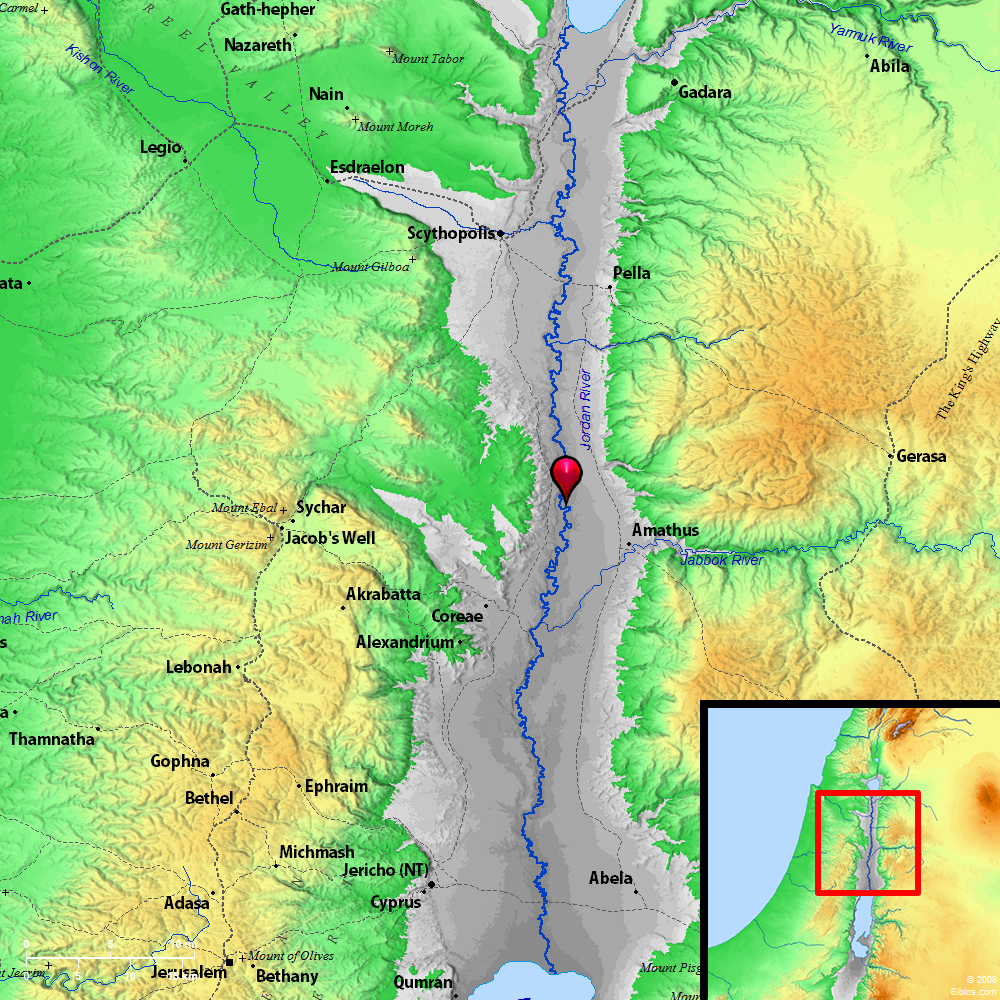Atlas  Beyond the River (Jordan) and surrounding region Maps Created using Biblemapper 3.0 Additional data from OpenBible.info Occurrences Ezra 4:10 and the rest of the nations whom the great and noble Osnappar brought over, and set in the city of Samaria, and in the rest of the country beyond the River, and so forth.Ezra 4:11 This is the copy of the letter that they sent to Artaxerxes the king: Your servants the men beyond the River, and so forth. Ezra 4:16 We inform the king that, if this city be built, and the walls finished, by this means you shall have no portion beyond the River. Ezra 4:17 Then sent the king an answer to Rehum the chancellor, and to Shimshai the scribe, and to the rest of their companions who dwell in Samaria, and in the rest of the country beyond the River: Peace, and so forth. Ezra 4:20 There have been mighty kings also over Jerusalem, who have ruled over all the country beyond the River; and tribute, custom, and toll, was paid to them. Ezra 5:3 At the same time came to them Tattenai, the governor beyond the River, and Shetharbozenai, and their companions, and said thus to them, Who gave you a decree to build this house, and to finish this wall? Ezra 5:6 The copy of the letter that Tattenai, the governor beyond the River, and Shetharbozenai, and his companions the Apharsachites, who were beyond the River, sent to Darius the king; Ezra 6:6 Now therefore, Tattenai, governor beyond the River, Shetharbozenai, and your companions the Apharsachites, who are beyond the River, you must stay far from there. Ezra 6:8 Moreover I make a decree what you shall do to these elders of the Jews for the building of this house of God: that of the king's goods, even of the tribute beyond the River, expenses be given with all diligence to these men, that they be not hindered. Ezra 6:13 Then Tattenai, the governor beyond the River, Shetharbozenai, and their companions, because that Darius the king had sent, did accordingly with all diligence. Ezra 7:21 I, even I Artaxerxes the king, do make a decree to all the treasurers who are beyond the River, that whatever Ezra the priest, the scribe of the law of the God of heaven, shall require of you, it be done with all diligence, Ezra 7:25 You, Ezra, after the wisdom of your God who is in your hand, appoint magistrates and judges, who may judge all the people who are beyond the River, all such as know the laws of your God; and teach him who doesn't know them. Ezra 8:36 They delivered the king's commissions to the king's satraps, and to the governors beyond the River: and they furthered the people and the house of God. Nehemiah 2:7 Moreover I said to the king, If it please the king, let letters be given me to the governors beyond the River, that they may let me pass through until I come to Judah; Nehemiah 2:9 Then I came to the governors beyond the River, and gave them the king's letters. Now the king had sent with me captains of the army and horsemen. Nehemiah 3:7 Next to them repaired Melatiah the Gibeonite, and Jadon the Meronothite, the men of Gibeon, and of Mizpah, that appertained to the throne of the governor beyond the River. Encyclopedia BEYONDbe-yond': Found in the Hebrew only in its application to space and time, and for these ideas three words are employed: hale'ah (Genesis 35:21) = "to the distance"; `abhar = "to go beyond" "to cross" derivative `ebher (Chald. `abhar) = "across," "beyond" (Deuteronomy 30:13 Joshua 18:7 Judges 3:26 1 Samuel 20:36 2 Chronicles 20:2 Ezra 4:17, 20 Jeremiah 25:22); and `al (Leviticus 15:25) = "beyond the time." In the New Testament peran, is used to express "beyond" in the spatial sense (Matthew 4:15), while other words and phrases are employed for adverbial ideas of degree: huperperissos (Mark 7:37); huper (2 Corinthians 8:3; 2 Corinthians 10:16); kathuperbolen (Galatians 1:13). In the King James Version be`eher, is occasionally translated "beyond," and when this word is joined to ha-yarden, "Jordan," as it usually is, it becomes critically important. In the American Standard Revised Version, be`ebher ha-yarden is translated "beyond the Jordan," in Genesis 50:10, 21 Deuteronomy 3:20, 25 Joshua 9:10 Judges 5:17; "on this side Jordan" in Deuteronomy 1:1, 5 Joshua 1:14, 15; "on the other side Jordan" in Deuteronomy 11:30 Joshua 12:1; Joshua 22:4; Joshua 24:2, 8 (compare the King James Version and the Revised Version (British and American), Joshua 24:14, 25; see RIVER, THE), Judges 10:8 1 Samuel 31:7; and "on the side of Jordan" in Joshua 5:1. the American Standard Revised Version gives "beyond the Jordan" throughout. me`ebher, is used with ha-yarden in Numbers 34:15; Numbers 35:14 Joshua 13:32 Judges 7:25; and `ebher, alone in Deuteronomy 4:49 (the King James Version "on this side"); Joshua 13:27 (the King James Version "on the other side"). It is clear that the phrase may be translated "across Jordan"; that it is used of either side of the Jordan (Deuteronomy 3:8 speaks of the eastern, Deuteronomy 3:20, 25 of the western); that "beyond Jordan" may be used of the side of the Jordan on which the writer stands (Joshua 5:1; Joshua 9:1; Joshua 12:7); but from the fact that Deuteronomy 1:1, 5; Deuteronomy 4:41, 46, 47, 49, where statements are made about Moses, the reference is to the country East of the Jordan, while in Deuteronomy 3:20, 25; Deuteronomy 11:30, where Moses is represented as speaking, the West is indicated, critics have concluded that the author (at least of Deuteronomy) must have lived after Moses, being careful to distinguish between himself and the prophet. |



